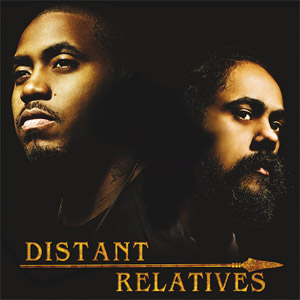You know, whether it’s the case or not, it feels like we’ve been waiting forever for this one. Following Untitled, let down, I immediately began rooting around to see what he had up next. Talk of Distant Relatives began quite a while ago, I recall thinking the album had to be coming soon probably a year ago. Now that the record’s out, it’s yet another hip hop record where the delays really weren’t warranted.
This album received practically no press, at least for an album featuring someone as big of a deal as Nas. Might seem silly, but I wonder if the record execs were less faithful in the record as it couldn’t be marketed simply as a Nas album. As buzz amongst the hip hop world grew, the presence of Damian Marley was something of a mystery. Would he be that prominently featured? Many people, attached to Nas, assumed and hoped Marley’s presence would be fleeting, just backing up the hip hop godfather.
This isn’t the case. Damian is just as much of a presence on the record as Nasir, sometimes – yes, really – overshadowing the great. Nas, is both the album’s greatest asset and detractor. What’s that I said? Well, he’s Nas. His flow is absurdly fantastic, smooth and equally in turns forceful. It’s pretty much understood he can at the very least hold his own, if not out rap, anyone in the game. His presence over the reggae-infused beats and Damian’s singing is great one the ears, and he can pretty much carry you through the album regardless as to what he’s saying.
What then, you ask, is the problem? It’s nothing new with Nas: the guy takes himself pretty damn seriously. Sure, with the presence he holds in hip hop, he can more or less afford this, and might even deserve it. Doesn’t always make for great music, however. This whole record, by and large, tries to be a message piece. Nas and Damian are reaching out to Africa and its people, apparently the proceeds from the album are even intended to go to building a school in the Congo.
Any attempt at a serious message album is a risk. This might ring particularly true for hip hop, raps come off as cheesy much more quickly than other “serious” songs might in other genres. Think Isaac Brock could have pulled off The Lonesome Crowded West’s themes had he been an MC? Doubtful. Of course the best of the best can do it – Nas included (think “Undying Love”), but an album with a social message is a beast of a different nature. Think rappers that have made these sort of statements – N.W.A, Public Enemy, and so on. Not to decry or reduce the value of those songs, but those messages were typically indirectly imparted through violence and anger. Within hip hop, this worked quite while.
Now Nas and Damian are basically together just rapping/singing, “Africa Must Wake Up” (which is in fact the title of the last track). It simply doesn’t always work. The lyrics, when at their most message-y, often come off as clumsy and heavy-handed. Perhaps the best example of this is Nas’ “verse” on “Patience”, a track with a fantastic beat that samples Sabali. There’s a slow build up to his verse, and it just feels like one of those beats he’d kill. Then he comes and basically talks to the listener, boring with lines like, “Who wrote the Bible?” Damian tends to avoid this pitfall better than his counterpart, either forming the backing vocals or simply spitting enjoyable lyrics, such as on the album opener, “As We Enter,” which is in fact one of the album’s standout moments. On it, neither artist is in preacher mode, and the two switch back and forth rapidly over a fantastic beat. It’s a great cut, worthy even of modern hip hop classic track status.
However, the large majority of the album lies in the, sadly, “tries too hard” region. Take “My Generation” featuring Lil Wayne and – inexplicably – Joss Stone. Its choir-backed chorus is certainly well-intended but, at least to my ears, just comes off as cheesy. I suppose it’s a cynical world in which simple, sweet messages come off as silly, but that’s hip hop. Still, in the end, it’s a very listenable record. I can point out its failings all I want, but Nas and Damian Marley are simply enjoyable to listen to and in a period in which hip hop seems to rest in the doldrums the sort-of-trying-something-different fusion of rap and reggae is a bit of a breath of fresh air, even if it’s a bit dirtied by the actual material. May seem a bit harsh, but this album features two talented men weighed down by their noble goal.

